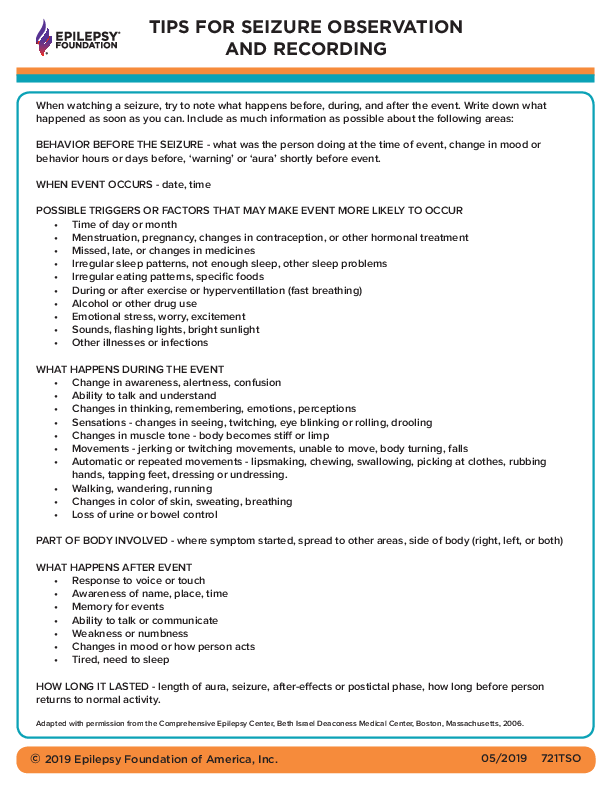Seizure Observation
What should I look for during a seizure?
Before you can track seizures, you need to know what to look for. Seizures can be broken down into 4 phases:
- Prodrome: behaviors or feelings that occur hours to days before a seizure
- Aura: the actual start of a seizure and may be thought of as a 'warning'
- Ictus: the seizure event
- Postictal: the recovery period after the seizure
Tips for Seizure Observation
When watching a seizure, try to note what happens in each phase of the seizure – before, during and after the event. Write down what happens as soon as you can – it’s easy to forget details when you don’t write them down. Here’s a list of things that may happen during a seizure. Remember that what you see will depend on the type of seizure that occurs.
Behavior before the seizure:
- What was the person doing at the time of the event?
- Was there a change in mood or behavior hours or days before?
- Was there a warning or aura right before the seizure?
When the event occurs: Note date and time.
Possible triggers: Note patterns or any factors that may make event more likely to occur.
- Time of day or month
- For females, note the day of your menstrual cycle, if pregnant, on any birth control or other hormonal treatment
- Missed or late medicines, changes in medicine doses
- Not sleeping regularly, not enough sleep, other sleep problems
- Not eating regularly, bothered by specific foods
- During or after exercise, note the kind of exercise such as jogging
- During or after fast breathing
- Alcohol or other drug use
- Emotional stress, worry, excitement
- Sounds, flashing lights or patterns, bright sunlight
- Other illnesses or infections
- When taking other medicines, over-the-counter products, or supplements
What happens during the event: Note changes in the following...
- Awareness, alertness, confusion
- Ability to talk and understand – clear speech, responds with only a few words or noises, speech doesn’t make sense, unable to talk
- Thinking, remembering, emotions, perceptions
- Seeing, hearing, tasting, smelling, feeling - May have different or unusual sensations, or may sense something that is not really there
- Facial expression – staring, twitching, eye blinking or rolling, drooling
- Muscle tone – body becomes stiff or limp
- Movements - jerking or twitching movements, unable to move, body or head turning to one side, falls
- Automatic or repeated movements – lipsmacking, chewing, swallowing, picking at clothes, rubbing hands, tapping feet, dressing or undressing
- Walking, wandering, running
- Color of skin, sweating, breathing
- Loss of bladder or bowel control
Part of body involved: Note where the symptoms started, whether it stayed in that area or spread to other parts of the body, and which side of the body was involved (right, left, or both).
What happens after the event (postictal or recovery period): Is the person...
- Able to respond to voice or touch
- Aware of their own name, observer’s name, place, time
- Able to remember what happened
- Able to talk or communicate
- Weak or numb in any part of the body
- Having a change in mood or behavior
- Tired or need to sleep
- Other symptoms – for example headache, upset stomach, pain
How long it lasted:
- Length of aura or warning
- Length of seizure – from beginning to end, but not counting the recovery period
- Length of recovery or postictal period - how long before the person returns to normal activity
For more information:
Adapted with permission from the Comprehensive Epilepsy Center, Beth Israel Deaconess Medical Center, Boston, Massachusetts
Resources
Epilepsy Centers
Epilepsy centers provide you with a team of specialists to help you diagnose your epilepsy and explore treatment options.
Epilepsy Medication
Find in-depth information on anti-seizure medications so you know what to ask your doctor.
Epilepsy and Seizures 24/7 Helpline
Call our Epilepsy and Seizures 24/7 Helpline and talk with an epilepsy information specialist or submit a question online.
Tools & Resources
Get information, tips, and more to help you manage your epilepsy.




